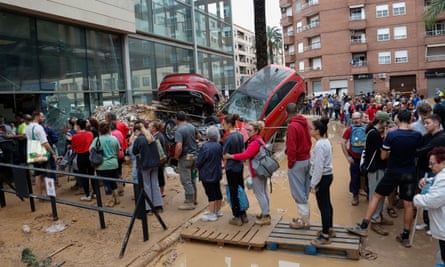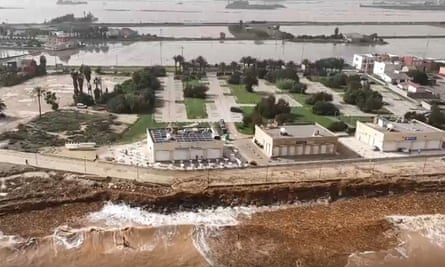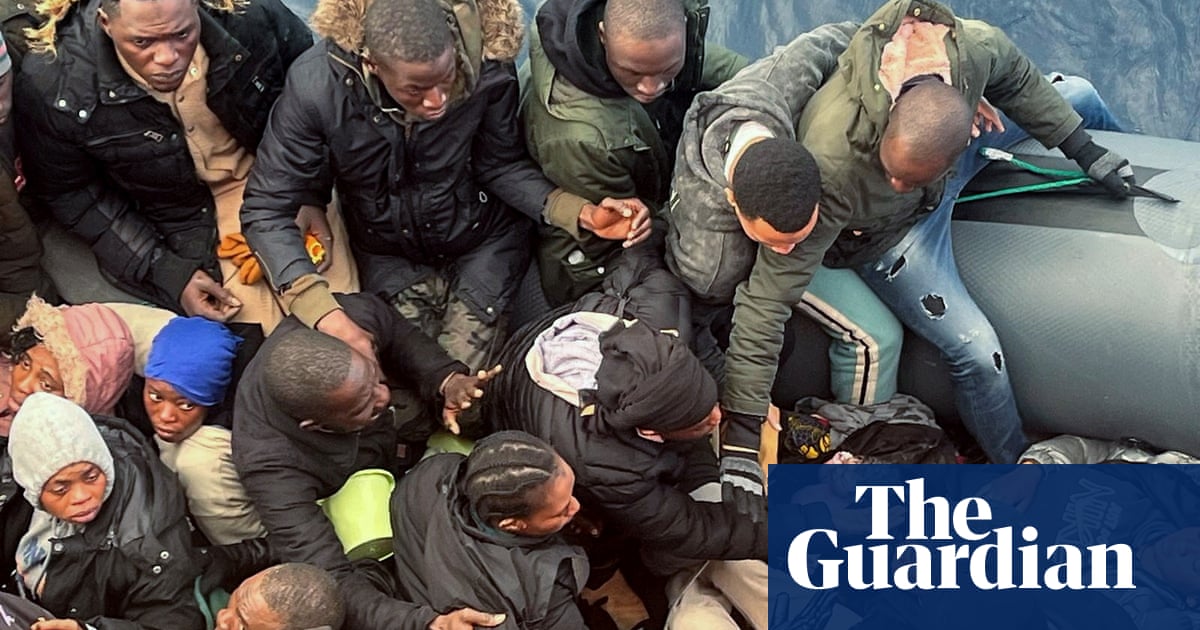As public buildings across Spain lowered flags to half-mast to mark the first of three days of national mourning, Letícia Cardona Teruel set off with her husband and eight-year-old daughter – their rucksacks packed to the brim – to walk the seven kilometres to Valencia.
About 36 hours earlier on Tuesday, they had watched as rivers of mud-coloured water coursed through their small town of Paiporta, swamping the ground floor of buildings, sweeping away cars and submerging local plazas. On Thursday, as access roads remained mostly cut off, they were among a dozen or so residents who were walking to the regional capital in hopes of staying safe.
The journey gave them a first-hand look at the devastation wreaked by the storm: streets littered with piles of cars and street lights that lay scattered on the ground.
“Everything is destroyed,” said Cardona Teruel, speaking to the Guardian by phone. “It’s like a zombie apocalypse that you see in the movies.”
This week the quiet commuter town of Paiporta became known across Spain as one of the places to have been worst affected by the country’s deadliest flood in modern history. Of the reported 155 deaths in the region of Valencia, at least 62 – nearly half – occurred in the town, leaving many reeling with grief amid anger that there had been no official alert before water began surging through their town.
“There was no warning,” said the town’s mayor, Maribel Albalat. In the absence of any sign that this storm would be different from any other, many residents had gone down to garages beneath their apartments to move their cars to higher ground.
“We’re told that that’s where a lot of people were caught,” said Albalat. Later, explaining that the floodwaters had surged just as many residents were at ground level or underground, she was more blunt. “It was a trap,” she told the broadcaster TVE.
Among the residents who lost their lives were Lourdes María García and her three-month-old baby. She had been in a car with her partner, Antonio Tarazona, when the waters started to rise around them.

As the car began to float, Tarazona got out in an attempt to pull the family to safety. Instead he found himself swept away by the currents. “The currents began to drag the car down,” he told El País. “The last thing I saw was them calling for help from the roof of the car.” Police later confirmed that the bodies of García and the baby had been found.
At the local care home, the floods struck just as residents were having dinner. Videos posted online showed them screaming as water came rushing in, leaving staff wading frantically through knee-deep waters to carry residents to higher floors. While they managed to save the majority, six people died.
Several inhabitants of Paiporta spoke of being caught off guard by the floods, given that it hadn’t been raining in the area at the time. For Andries Klarenburg, an English teacher from Manchester living in Paiporta, the first inkling that something was wrong came when the electricity shut off.

“I look out the window and the first thing I see is, literally, cars floating down the street of where I live,” he said. “It was really surreal.”
His thoughts immediately turned to his wife and their one-month-old daughter, who were driving back to their flat with his mother-in-law. He tried to call but his phone battery was dead. “I had no idea if they were alive or dead until I could charge my phone via an old laptop.”
About three kilometres away, his wife, Florencia Rey, was frantically debating what to do. They had turned on to one street after spotting flooding on another, only to find themselves surrounded by rising waters. Water had started entering the car, filling it rapidly. “The car started to move, even with the brakes on,” said Rey.
She wrenched open the door, going through the boot of the car to pull her baby out of the car seat. The three of them waded through three feet of water, eventually making their way to the second floor of a warehouse. During brief bursts of phone coverage they managed to connect with Klarenburg and keep in touch during the eight hours it took before they were rescued by police.
After being reunited on Wednesday morning, the family was on Thursday safe in their third-floor apartment but without water or reliable access to food. “We’ve felt very isolated because there’s no government presence or anything like that,” said Klarenburg. “There are helicopters overhead, sirens but everything that is being done is being done by the community, like clearing the road or moving cars.”
Albalat said the community was in shock. “The situation is catastrophic … We don’t have electricity in some areas; we’re without water and communication is difficult,” she told broadcaster Onda Cero.

Scientists say the human-driven climate crisis is increasing the length, frequency and intensity of extreme weather events. The warming of the Mediterranean, which increases water evaporation, is also thought to play a key role in making torrential rains more severe.
The gravity of the floods took most in Paiporta by surprise. The state weather agency, AEMET, had launched a red alert for the region on Tuesday morning. But it took until just after 8pm for the civil protection service to send an alert urging residents not to leave their homes.
For Cardona Teruel, the official alert came after she had moved her car and waded through knee-deep waters to make it back to her house.
“We’re very upset,” she said. “Prevention is about getting ahead of what might happen … at no time was there talk of evacuating homes or people not taking their cars. There was none of that. You can’t send alerts when the worst has already happened.”

.png) 2 months ago
25
2 months ago
25













































